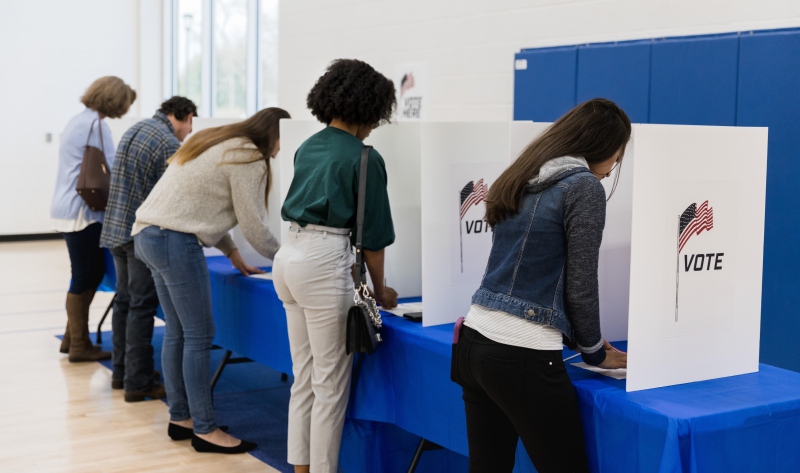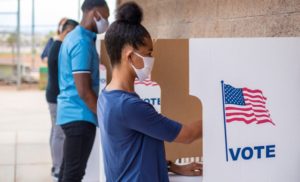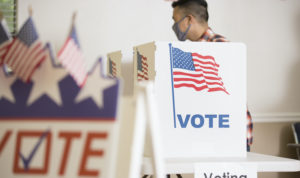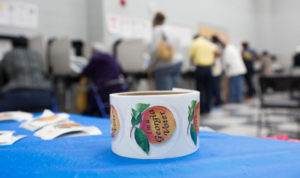
Scholars argue that civic duty voting could revive American democracy.
Despite historically high voter turnout rates in the 2020 general election, the United States still ranks in the lower half of developed countries for voter turnout.
Low voter turnout can threaten a democracy by inaccurately representing the needs of citizens, particularly marginalized individuals who face the greatest barriers to political participation.
To reach higher levels of participation and a more representative electorate, senior Brookings Institution fellow E.J. Dionne Jr. and a working group of experts argue in a recent report that the United States should adopt universal civic duty voting. Universal civic duty voting legally requires that all eligible citizens participate in all general and local elections.
In the working group report released by both the Brookings Institution and the Ash Center for Democratic Governance and Innovation at the Harvard Kennedy School, the authors noted that although most people oppose the idea of mandatory voting, they do believe voting is both a right and a duty. The working group hopes that once the public sees the benefits of a universal voting scheme, more people will support the codification of a duty to vote.
Critics of universal voting most commonly fear that the policy violates the freedom not to speak, protected by the First Amendment. The working group argues that its proposed policy only requires attendance in elections— “the voter is free to check-in as having participated (in person or by mail) and walk away without casting a ballot.” The group maintains that the policy does not force citizens to exercise the speech-related elements of voting, such as choosing a specific candidate. Rather, universal voting compels conduct, similar to paying taxes or serving on a jury.
Another common concern among critics of universal voting is that the policy would penalize people from marginalized communities who may have institutional barriers to voting. The working group emphasizes that “the purpose of civic duty voting is to increase participation, not to lay traps for voters or penalize vulnerable communities.”
The group maintains that “mitigating the possible disparate effects of the policy must be a top priority.” For example, it explains that a penalty for non-compliance would be minimal. The fine would not exceed $20, accrue late fees, nor impose further penalties if not paid. Non-compliers could also substitute the fine with community service.
The working group also emphasizes that complementary voting reforms must accompany a civic duty voting scheme for the policy to work and avoid exacerbating inequalities. Such reforms include same-day, automatic, and online voter registration, expanded early and absentee voting, accessible polling places, and restored voting rights for citizens with felony convictions.
The working group contends that the potential benefits of a universal voting scheme extend beyond increased voter turnout. Mandatory voting could assist in a “rebirth” of civic life.
With a comprehensive mandatory voting scheme and its corresponding voting reforms, the Brookings-Harvard working group argues that campaigns and organizations dedicated to protecting the right to vote could now focus on educating voters about the issues and candidates.
Mandatory voting would widen the electorate, widening the political spectrum that candidates must represent. The working group suggests that candidates could begin to reject polarizing views and avoid “divisive rhetoric and vilifying particular groups.”
With citizens compelled to vote—perhaps in a less volatile political climate—the working group predicts that “some citizens, initially empowered by their votes, would be drawn to deepen their participation in other aspects of civic life.”
The working group supports its optimism about a civic duty voting scheme by noting the “dramatic increases in participation” in countries that “have carefully implemented versions of civic duty voting.”
Australia, for example, saw voter participation soar from 60 to 91 percent after enacting mandatory voting. Although citizens could turn in blank ballots, only about 20 percent did.
Beyond voting laws, Australia also established a voting culture that encourages citizens to participate in democracy. After voting, citizens often receive “democracy sausages” at community barbecues. Australian voter Neil Ennis reportedly said, “Everyone turns up. Everyone votes. There’s a sense that: we’re all in this together. We’re all affected by the decision we make today.”
Inspired by Australia’s model, the Brookings-Harvard working group encourages policymakers to consider offering non-partisan, viewpoint-neutral incentives to complement a mandatory voting program. These incentives could include entering voters into a lottery for a financial prize, awarding voters “reduced fees for government services,” or giving voters “favorable access to public employment or educational opportunities.”
In adopting a comprehensive civic duty voting scheme as other countries have, the members of the working group argue that the United States could see a similar increase in democratic participation, along with a decrease in inequality, and moderation of the nation’s overall political atmosphere.



